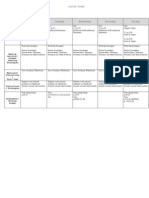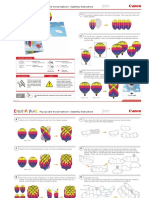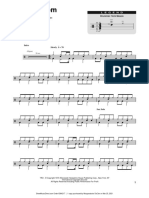Syllabus UKG 2024-25
Syllabus UKG 2024-25
Uploaded by
nickey.23octCopyright:
Available Formats
Syllabus UKG 2024-25
Syllabus UKG 2024-25
Uploaded by
nickey.23octCopyright
Available Formats
Share this document
Did you find this document useful?
Is this content inappropriate?
Copyright:
Available Formats
Syllabus UKG 2024-25
Syllabus UKG 2024-25
Uploaded by
nickey.23octCopyright:
Available Formats
SUBJECT UT-1 HALF YEARLY UT-2 ANNUAL
- TOPICS TOPICS PROJECT TOPICS TOPICS PROJECT
Plant a sapling at your
• Vowel Sounds(Pg 14-20) • Use of He , His , She ,
• Vowel Sounds home during summer • Use of ‘And’ Prepare 3 finger puppets
(o, u) Her
break, give it a name,
water it daily, take care of 1. Animals and Birds (roll
(Pg 5-13) (A, E, I) • Use of This/That (Pg 33 -34) (Pg 39 & 40 )
it and submit it after no- 1-20)
summer break. Also share 2. Opposites (roll no- 21-
(Pg 24)
ENGLISH WRITTEN (ENGLISH PRIMER)
your experience of having 30)
a new green friend. • Use of ‘ I ,You , My 3. Days of the Week (roll
• Use of A / An • Use of Yes
, Your no- 31-40)
Months of the Year (roll no-
(Pg 21 & 22) • Use of These (Pg 35 & 36) (Pg 41)
41-50)
(Pg 25)
• Use of ‘We’ and
• Use of No
‘They’
• Use of Those (Pg 37 & 38) (Pg 42 & 43 )
• ( Pg 26)
• What is This / That
• Use of This / Those
(Pg 27) (Pg 44)
• Action Words ( Pg 45
& 46 )
• Opposite Words ( 47 &
48 )
• Use of Has / Have ( Pg
49 & 50 )
• Days of the Week ( Pg
51 )
• A Year ( Pg 52 & 53 )
• Five lines on ‘ My Pet ‘
• Months of the
• Gender
ENGLISH (ORAL)
Year(with spelling)
• Five Fruit • Days of the Week
• Five lines on the topic
• -----
Five Vegetables name
“My School”
• Five Flowers name
• Five lines on the topic
“Myself”
ENGLISH RHYMES
(All For Kids
Rhymes)
Pg no( 22-40 )
Pg no(2- 20 )
(BUNNY ENGLISH
ENGLISH READING
Pg no(4, 5, 7, 8,10, Pg no(33, 35, 37, 39,
PRIMER)
11, 13, 14, 16, 17, 19, 41, 42, 44, 45, 49, 52,
24, 25, 27) 54)
Pg no(50-55, 58-68,
BOOK(ENGLISH
Pg no(1-49, 80-96,
ACTIVITY
ENGLISH
WORK)
160-164) 98-103, 122-130,
137, 138, 143-146)
SUBJECT UT-1 HALF YEARLY UT-2 ANNUAL
- TOPICS TOPICS PROJECT TOPICS TOPICS PROJECT
Prepare one craft item Prepare a clock using
• Revision Numbers Table of (4,5,6) • Table of (7,8,9) • Table of
with the help of 2D and waste materials.
(1- 100) (Pg 63) (Roll No. 1-50) • Numbers name (10,11,12) (Roll No. 1-50)
• Mixed
(Pg-16,24,30,31,35, • Numbers name (51-70)
Tables(212)
36,37) (21-50) • Roman Numerals • Numbers name ----
• Numbers • Shapes (2D & 3D) (1-20) (71-100)
(101-200) (Pg 12-15) • Time • Ordinal numbers
• Table of (2,3) • Reverse counting (1-10)
MATHS WRITTEN MATHS-C
• Reverse counting
(Pg 62) (50-1)
(100-51)
• Numbers name (Pg 18) • Addition (Double
• What comes
(1-20) digit)
before, after and
(Pg 19,26) between (1-50) (Pg 46,47)
(Pg 22)
• Addition (Single • Subtraction
digit) (Double digit)
(Pg 40-45) (Pg 54-57)
• Subtraction
(Single
digit) • Multiplication
(Pg 48-53) (Single digit)
(Pg 58-61)
What comes before, after
• Put the sign(<,>,=)
and between
(1-50) (51-100)
(Pg 52)
• Ascending and
Descending order
(1-50) • Put the sign
(Pg 38,39) (<,>,=)
Tables (2-6) Tables (2-12)
MATHS ORAL
Numbers name Numbers name
(1-50) (51-100)
Shapes (2D & 3D) Ordinal numbers
Reverse counting (50-1) (1-10)
Reverse counting
(100-50
MATHS ACTIVITY
BOOK (NUMBER
Pg no(8-87) Pg no(88-195)
WORK)
Tomato ( Paper tearing
(HELLO
Fish ( Cotton bud
CRAFT
ART)
impressions ) and pasting )Page no.-33
Page no.- 32
-----
(HELLO
ART)
ART
Page no.- 3 – 18 Page no. – 19 – 29, 32 - 38
(ART GALLERY)
3-D Shapes, Butterfly,
Fun with numbers, Fish,
Rangoli,
2-D Shapes, Umbrella
DRAWING
Santa Claus’ Face,
EDUCATION
Prayer before Meal ,
VALUE
Prayer Before Class, Prayer Learn any short story with
After Class a moral
Q.1-Q.10 Q.1-Q.5
SUBJECT UT-1 HALF YEARLY UT-2 ANNUAL
- TOPICS TOPICS PROJECT TOPICS TOPICS PROJECT
Choose your favourite
topic from the given one Learn a poem (in hindi)
• ‘अ’ बिना मात्रा के and prepare 5-6 lines on outside from your course
• उ की मात्रा • ओ की मात्रा • ‘अनुनाबिक’ की मात्रा
HINDI WRITTEN (SWAR SARGAM)
शब्द the same for oral book and write it on a
presentation after Summer cloured A-4 size sheet.
Break:
(Pg 4, 5) (Pg 15, 16, 17) (Pg 29, 30, 31) (Pg 37, 38)
मेरा बिद्यालय • बििर्ग (:) की मात्रा
• (ाा) आ की मात्रा • ऊ की मात्रा नानी घर की िैर • औ की मात्रा (Pg 39, 40) ----
(Pg6, 7, 8) (Pg 18, 19, 20) र्मी की छु बियाां (Pg 32, 33, 34)
• पदे न की मात्रा
• इ की मात्रा • ऋ की मात्रा • ‘अनुस्वार’ की मात्रा (Pg 43, 44)
(Pg 9, 10, 11) (Pg 21, 22) (Pg 35, 36)
• आधे व्यांजन का प्रयोर्
• ई की मात्रा • ए की मात्रा • रे फ की मात्रा (Pg 45, 46)
(Pg 12, 13, 14) (Pg 23, 24, 25) (Pg 41-42)
• ऐ की मात्रा
(Pg 26, 27, 28)
HINDI ORAL
• Ginti (1-10) • Mahino ke naam
• saptah ke naam Mera School
Mera Parichay
HINDI RHYMES
(BALGEET)
Pg no(2-17) Pg no(18-32)
(SWAR SARGAM)
HINDI READING
Pg no(4,7, 10, 13, 16, 19, Pg no(30, 33, 35, 37, 39,
22, 24, 27) 41,. 43, 45)
SULEKH(HINDI
SULEKH-C
HINDI
Pg no(2-7) Pg no(8-15) Pg no(16-23) Pg no(24-32)
CURSIVE WRITING)
ENGLISH WRITING
(BUNNY JOY OF
Pg no(2-8) Pg no(9-16) Pg no(17-24) Pg no(25-32)
ENVIRONMENTAL
EVS (BEGINWITH
Unit 1& 2 (Pg no-6 to pg Unit 3 & 4 (Pg no-40
no-38) to pg no-73)
STUDIES)
Project-I (pg no. 74) Project-II(pg no. 75)
Assignment-I (pg no. 76-
80) Assignment-II(pg no. 81-86)
SUBJECT UT-1 HALF YEARLY UT-2 ANNUAL
-
CONVERSATION(INTRODUCTORY) TOPICS TOPICS PROJECT TOPICS TOPICS PROJECT
L- 1: My Self L- 23 : Directions
L-2: My School L- 33 : Safety
ENGLISH
L- 34 : Some Common
L-3 : Good Habits
Questions
L- 35 : Things to
L-4 : Colours
Remember
L-5 : Parts of the Body L- 36 : Use of Things
L-21 :People Who Help
Us L- 38 : Time
- 17 : Young ones of
L- 6 : Days of the Week
(BUNNY ENGLISH CONVERSATION)
Animals
L- 7 : Months of the Year L – 18 : Cries of Animals
L-8 : Pet Animals L- 19 : Walks of Animals
L- 20 : Some Common
L- 9 : Animals
Opposites
GENERAL KNOWLEDGE
L-10 : Birds L- 26 : Our Houses
L-11 : Insects L- 28 : General Questions
L -12: Flowers L-29 : Uses of Water
L- 13 :Fruits & Vegetables L- 30 : Fire
L- 14 : The Food We Eat L -31: Games
L- 15 : Food of Animals L- 32 : Shapes
L- 37 : What are they
L- 16 : Homes of Animals
made of
Q1. Who is the Father of Q1. How should we behave
all? with our elders?
Ans. We should obey and
Ans. God is the father of all.
respect our elders.
Q2.What should we ask
when we see somebody in
Q2.Where is God?
need? Ans. We should ask -
"How can can I help you?"
Q3.Where should we
Ans. God is everywhere
throw the waste?
VALUE EDUCATION(ORAL- QUESTION/ANSWERS)
Q3. Why should we thank Ans. We should throw the
God? waste in the dustbin.
Ans. We should thank God Q4. What kind of clothes
for everything. should we wear?
Q4. What are the three Ans. We should wear neat
magical word and clean clothes.
Ans. The three magical
Q6. How should we treat
words are sorry, please
the animals?
and thank you.
Ans. We should treat them
Q5. What is sharing?
with love and care.
Q7.Name any four good
Ans. Sharing is caring.
habits?
Q6. How do good childern
Ans. Four good habits are-
speak?
We should get up early in
Ans. They always speak
the morning, brush our
good words.
teeth Q4.Where is God?
Ans. God is everywhere,
Q7. What should good
take a bath daily, and trim
childern not do?
your nails.
Ans. They should not tell a
lie.
Q8.Should we waste food?
Ans. No, we should not
waste food.
SOCIAL ETTIQUETES AND GOOD MANNERS TABLE MANNERS
GOOD MANNERS EVERY CHILD SHOULD LEARN TABLE MANNERS FOR KIDS
* Being kind and helping those in need Come to the table with clean hands and face.
* Speaking the truth Put your napkin on your lap.
* Listening with patience. Start eating when everyone else does-or when given the okay to start.
* Responding politely and promptly. Stay seated and sit up straight.
* Apologizing for mistakes. Keep elbows (and other body parts!) off the table while eating.
* Taking care of the elderly. Chew with your mouth closed and don't talk until you've swallowed.
* Refraining from using foul words. Don't make bad comments about the food.
* Being grateful for someone's help. Say "Please pass the..." instead of reaching the food item.
LEARN AND PRACTICE IT DAILY
* Greeting others with kindness and respect. Chat with everyone at the table.
* Saying "Please" when asking Don't make rude noises like burping or slurping.
* Saying Thank you" when receiving Ask to be excused when finished.
* Show respect for others and elders Thank your host or whoever prepared the meal.
* Be polite when someone serves you Offer to help clear the table.
* Put away technology at mealtimes and conversations. USE PLEASE AND THANK YOU.
* Open the door for others and greet people with a smile. TAKE JUST RIGHT SIZE SMALL BITES.
* Shake hands and make eye contact with greeting someone. TAKE UP YOUR DISHES WHEN FINISHED EATING.
* Do not damage someone else's property.
* Do not litter your surroundings.
* Greet older adults with respect and kind words.
* Do not directly point at other
If you are standing in a queue, wait for your turn patiently.
Do not scream or shout unnecessarily in public places.
Welcome people you know with a smile and a polite "Hello" .
Practice saying "excuse me" or "sorry" if you bump into someone.
Do not run on a busy road.
You might also like
- Piping Design and Engineering - ITT-GrinnellDocument265 pagesPiping Design and Engineering - ITT-Grinnellandrés morantesNo ratings yet
- Anodisation de L'aluminium Et de Ses AlliagesDocument4 pagesAnodisation de L'aluminium Et de Ses AlliagesalphaNo ratings yet
- PreviewA Field Guide To OtherkinDocument30 pagesPreviewA Field Guide To Otherkinfinder136100% (3)
- Katakana Rules (1) ADocument167 pagesKatakana Rules (1) AmesondemasaNo ratings yet
- Week of Jan 31 2011 Geometry - SSmithDocument2 pagesWeek of Jan 31 2011 Geometry - SSmithstsmithNo ratings yet
- Session Schedule eDocument1 pageSession Schedule eHori HoriNo ratings yet
- Class 4thDocument3 pagesClass 4thaman shahNo ratings yet
- Wa0023.Document6 pagesWa0023.Samir AndresNo ratings yet
- Groundwater Mapping AreasDocument24 pagesGroundwater Mapping AreasGeorgeNo ratings yet
- Assignment 2 SolutionDocument5 pagesAssignment 2 SolutionSaurav KumarNo ratings yet
- File 2Document3 pagesFile 2Buddy AnasNo ratings yet
- Botswana General Secondary: HRH TotalDocument11 pagesBotswana General Secondary: HRH TotaldiegocmakoNo ratings yet
- Destination B1-╤Б╤В╤А╨░╨╜╨╕╤Ж╤Л-1Document2 pagesDestination B1-╤Б╤В╤А╨░╨╜╨╕╤Ж╤Л-1NataliiaDavydenkoNo ratings yet
- Cambridge International AS & A Level: Geography 9696/01Document4 pagesCambridge International AS & A Level: Geography 9696/01Spencer HastingsNo ratings yet
- Portions Term 2 - Grade 6Document5 pagesPortions Term 2 - Grade 6adamrashad110No ratings yet
- Geotechnical AssignmentsDocument49 pagesGeotechnical AssignmentshuneNo ratings yet
- Physics Revision DPP-1 - EnglishDocument12 pagesPhysics Revision DPP-1 - EnglishAAVANI100% (1)
- Electrodynamics (Gradient, Divergence and Curl)Document6 pagesElectrodynamics (Gradient, Divergence and Curl)Jay Nahata100% (1)
- 7_PDFsam_Complete Analytical Solution for Linear Soil PressureDocument1 page7_PDFsam_Complete Analytical Solution for Linear Soil PressurehuangcwwieconNo ratings yet
- Science PSLE 2017 Booklet B - EditedDocument16 pagesScience PSLE 2017 Booklet B - EditedchukengtoonbernardNo ratings yet
- Flottation - Aspects PratiquesDocument3 pagesFlottation - Aspects PratiquesOliver Frere100% (1)
- 11 Vijaypath Mock Drill Test Series Round III 07 04 2024 Set P 1Document24 pages11 Vijaypath Mock Drill Test Series Round III 07 04 2024 Set P 1pravatonlineNo ratings yet
- 1.2 Blank Katakana Charts Assignment: Japanese 1BDocument3 pages1.2 Blank Katakana Charts Assignment: Japanese 1BSienna GuerreroNo ratings yet
- Spelling National Curriculum Correlation Chart Year 1Document2 pagesSpelling National Curriculum Correlation Chart Year 1Diliana NeychevaNo ratings yet
- N - TNPS Quiz # 55 (Eng)Document6 pagesN - TNPS Quiz # 55 (Eng)sohamnkotgireNo ratings yet
- lesson plan Maths 5 oct 30 to 31Document2 pageslesson plan Maths 5 oct 30 to 31ma.teresa06alviarNo ratings yet
- GD&T WikipediaDocument4 pagesGD&T WikipediaJayesh PatilNo ratings yet
- DTR BiometricDocument1,119 pagesDTR BiometricPat Dela CruzNo ratings yet
- 2023-Machine Tool Technology-Apr-May (AICTE)Document3 pages2023-Machine Tool Technology-Apr-May (AICTE)biswas0060701No ratings yet
- Effects of Urbanization On Landscape Patterns in A PDFDocument14 pagesEffects of Urbanization On Landscape Patterns in A PDFdevarshi purwarNo ratings yet
- Block Syllabus HSSC 1st Term 11 11 24Document3 pagesBlock Syllabus HSSC 1st Term 11 11 24Samina MajeedNo ratings yet
- BK Chap14Document73 pagesBK Chap14Jasmina Angelevska KostadinoskaNo ratings yet
- Evacuation Center EC Inventory Template 1 1 1Document3 pagesEvacuation Center EC Inventory Template 1 1 1jelly jmNo ratings yet
- 2018 Paper 1 Specimen InsertDocument4 pages2018 Paper 1 Specimen InsertAllan GohoriNo ratings yet
- 28 Bible Verses About FlowersDocument8 pages28 Bible Verses About FlowersTatenda ChirobeNo ratings yet
- Pop-Up-Air-Balloon I e A4 PDFDocument3 pagesPop-Up-Air-Balloon I e A4 PDFTanbaya RizkyNo ratings yet
- Preboard delhigovtDocument13 pagesPreboard delhigovtzandrexabNo ratings yet
- Manuf Proc Exam 2Document7 pagesManuf Proc Exam 2akjeevananthamNo ratings yet
- Commerce A RabeDocument179 pagesCommerce A RabeBouthaina EljeryNo ratings yet
- Artisan Training ScheduleDocument2 pagesArtisan Training Schedulemaroaevans18No ratings yet
- FormDocument3 pagesFormAhmad NassarNo ratings yet
- Boq SojolDocument5 pagesBoq SojolZam ZamNo ratings yet
- Sol Non SaturéDocument3 pagesSol Non SaturéXYZAB76No ratings yet
- 2nd Term Syllabus Sba23 24Document1 page2nd Term Syllabus Sba23 24perfect.educatorNo ratings yet
- Single Line Diagram01Document1 pageSingle Line Diagram01Mạnh NguyễnNo ratings yet
- BK Chap02Document68 pagesBK Chap02Jasmina Angelevska KostadinoskaNo ratings yet
- Zimbabwe School Examinations Council Physics 9188/4: T-1Ufakose HighDocument6 pagesZimbabwe School Examinations Council Physics 9188/4: T-1Ufakose HighLaura Mkandla0% (1)
- 9 Class Mathematics AY 2024-25Document5 pages9 Class Mathematics AY 2024-25hammadali7610No ratings yet
- All PDFDocument10 pagesAll PDFtechdual652No ratings yet
- Equals Math Noa Lesson 4Document2 pagesEquals Math Noa Lesson 4Lisa Thomas McQueenNo ratings yet
- June Exam 2023 - M4 STD Math - Topics To ReviewDocument5 pagesJune Exam 2023 - M4 STD Math - Topics To ReviewwillNo ratings yet
- Sano 2016 - Brickhouse Mies - Golden RuleDocument5 pagesSano 2016 - Brickhouse Mies - Golden Ruledaniela.202220739No ratings yet
- Yenamanoa Backing PartsDocument1 pageYenamanoa Backing Partsapi-26471097100% (2)
- Inosaur Azzle: Business & Service DirectoryDocument24 pagesInosaur Azzle: Business & Service DirectoryCoolerAdsNo ratings yet
- Hydrology Conventional Problems PyqDocument25 pagesHydrology Conventional Problems PyqSunny KumarNo ratings yet
- Us and ThemDocument6 pagesUs and ThemmodoNo ratings yet
- Q4 - English 2 RPSDocument8 pagesQ4 - English 2 RPSArmie JimenezNo ratings yet
- Cube Register LogDocument1 pageCube Register LogNickNo ratings yet
- Birds of Sri LankaDocument9 pagesBirds of Sri LankaKelum KonaraNo ratings yet
- The Zodiac PDFDocument35 pagesThe Zodiac PDFstefan100% (1)
- The Ashes That Made Tree BloomDocument25 pagesThe Ashes That Made Tree BloomNandini Pritesh PatelNo ratings yet
- Book 2 - Fabulous Phonics Word BanksDocument41 pagesBook 2 - Fabulous Phonics Word Banksmicaela coetzeeNo ratings yet
- SplintingDocument57 pagesSplintingNicholeNo ratings yet
- Reading (The Black Cat)Document4 pagesReading (The Black Cat)ISABELLA JULIAO DIAZNo ratings yet
- CollectionDocument52 pagesCollectionMichelle Escorial100% (1)
- Pornography and Addiction: Brain Chemistry Research and Porn (By Marnia Robinson)Document11 pagesPornography and Addiction: Brain Chemistry Research and Porn (By Marnia Robinson)Lobuscher56% (9)
- Kira's Animal Rescue Book American GirlDocument1 pageKira's Animal Rescue Book American GirladdepackhamNo ratings yet
- Pra RPSDocument4 pagesPra RPSWong Chooi TengNo ratings yet
- Humane Science Frog Anatomy Student WorkbookDocument69 pagesHumane Science Frog Anatomy Student WorkbookisekaidbreadNo ratings yet
- USMLE - VirusesDocument120 pagesUSMLE - Virusessapatel89No ratings yet
- BIA: Casino OkDocument2 pagesBIA: Casino OkKenoshaCasinoNo ratings yet
- BraingateDocument26 pagesBraingatevinutha91No ratings yet
- 10 2305-IUCN UK 2008 RLTS T19819A9019454 enDocument12 pages10 2305-IUCN UK 2008 RLTS T19819A9019454 enrentinghNo ratings yet
- Biopure FinalDocument22 pagesBiopure FinalNikhil JoyNo ratings yet
- Wolf PaperDocument8 pagesWolf PaperHannah GripNo ratings yet
- Sample Question Paper Class XII (2017-18) Class: Xii Biology (044) Marking Scheme Time: 3hours MM:70Document6 pagesSample Question Paper Class XII (2017-18) Class: Xii Biology (044) Marking Scheme Time: 3hours MM:70Nitin MhatreNo ratings yet
- Chapter 7 Bhs InggrisDocument7 pagesChapter 7 Bhs InggrislauriaNo ratings yet
- CSC240 Group Assignment 10Document4 pagesCSC240 Group Assignment 10try pfiNo ratings yet
- Fun For Movers 4th Edition Progress Tests-PáginasDocument10 pagesFun For Movers 4th Edition Progress Tests-Páginassu bonjNo ratings yet
- Embryology in The Holy QuranDocument43 pagesEmbryology in The Holy QuranShadab Ahmad KhanNo ratings yet
- Agriculture Jss2 CORECTEEDDocument3 pagesAgriculture Jss2 CORECTEEDDauda UsmanNo ratings yet
- 13) Indirect RetainerDocument25 pages13) Indirect Retainerطيبة نعمانNo ratings yet
- Etrian Odyssey-Quests-GuideDocument16 pagesEtrian Odyssey-Quests-GuideDanielNo ratings yet
- Food QuestionnaireDocument3 pagesFood QuestionnaireyehighNo ratings yet
- 12) Introvert To Extrovert in 6 StepsDocument19 pages12) Introvert To Extrovert in 6 Stepsganeshpatel9699No ratings yet
- NotesDocument9 pagesNotesneelu goyalNo ratings yet























































































